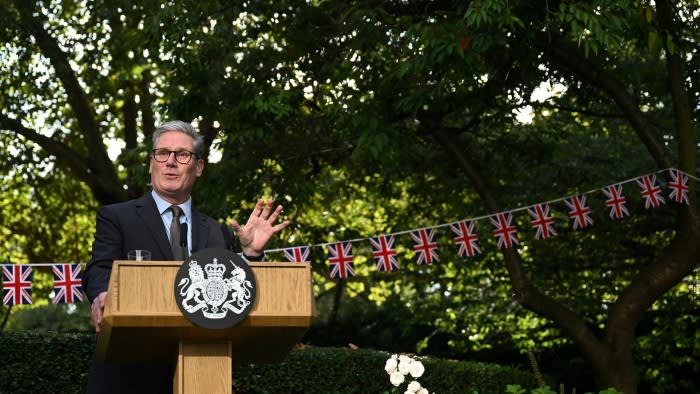This article is an on-site version of our Inside Politics newsletter. Subscribers can sign up here to receive the newsletter every day of the week. If you are not a subscriber, you can still receive the newsletter for free for 30 days
Good afternoon. As long term readers will know, I prefer to use the Ipsos poll where possible as it is the UK’s oldest poll, and I like to use the longest data set available.
Today I also like Ipsos no longer because he gave us his latest set of polls as an exclusive. It makes grim reading for Keir Starmer and the Labor party – but also for the leaderless Conservatives. Some more thoughts on this below.
Inside Politics is edited by Harvey Nriapia today. Read the previous edition of the newsletter here. Please send gossip, thoughts and feedback to insidepolitics@ft.com
Labor pains
Half of all British voters say they are disappointed with the way Labor has governed so far, as overall ratings of the government and the prime minister continued to decline.
How worried should Keir Starmer be? Well, her approval rating is worse now after 77 days in office than any of her predecessors, bar Liz Truss.

However, the most interesting points of comparison, I think, are with the first-term prime ministers who have been re-elected since Ipsos (then RSL) began measuring approval ratings: Margaret Thatcher, Tony Blair and David Cameron . Thatcher’s and Cameron’s ratings reached a lower depth in their first terms than Starmer’s. The two low points, I noted, came after the very painful budgets of 1981 and 2012.
One short-term problem Starmer has is that essentially everyone is anticipating a very painful Budget on October 30, and almost everyone thinks they will be the ones to feel the pain. But if, as for 2015 and 1983, the decisions of Rachel Reeves mean that she can provide more expansive Budgets after the line, it will not be a problem for long. It’s a bigger problem that, as well as scaring the general public, Labor seems to be worried about the economy, as consumer confidence has fallen according to figures released this morning.
A bigger problem, I think, is the bad smell raised by stories about donations of clothes, glasses and free tickets. Yes, they are all within the rules, but I think a) they look a bit dodgy, and b) worse, they look a bit ridiculous. Looking ridiculous is a very dangerous place for a political party to be, because if you are not seen as serious and by extension competent, then it is more difficult to convince people that you have to make their lives better.
Moreover, it is easy to see what will raise the perceptions of Starmer and the effectiveness of the government: it is the government that really delivers things, especially in the NHS (more than two thirds of people tell Ipsos that they will return to the NHS is Labour’s most important job). five missions—only 22 percent currently think they’re doing a good job of delivering that, though). And, as Alex Thomas notes in a smart blog on the Institute for Government, part of it is weakness at the center of government. which Starmer could and should solve.
Since “invent time travel and don’t accept three grand of glasses” isn’t an option, it’s a political wound that Starmer will just have to live with. He will have to hope that it is a political injury like “David Cameron riding his bike to work with a car driving behind him”, which has continued to come up in focus groups throughout his prime ministership, but not l It didn’t stop him from winning. Rather than a political injury like “Boris Johnson’s illegal lockout parties”.
But the good news for Starmer is that people don’t think much of the Conservatives: in truth Labor is still more popular (or more precisely they are less unpopular) than the Tory party as a whole.

While far more people voted for the minor parties at the last election than for a century – Robert Shrimsley’s excellent column on this here – my gut is that how people feel about the two major parties is still the most important variable. People fully understand how our electoral system works. If you vote for a smaller party to the left of Labour, such as the Greens, both your level of enthusiasm for Labor and the amount you fear a Conservative government matter. If you vote for the Liberal Democrats, your dislike of the Tory party and your lack of concern for a Labor government mattered. And if you voted Reform, your indifference to the Conservative party and your willingness to facilitate a Labor victory mattered.
Both parties have major challenges to overcome in the next five years. In some ways, the biggest question is whether you prefer to be the prime minister who must return to the condition of public services and the infrastructure of the country, or leader of the opposition who must return to a torn brand.
Now try this
I had a great time last night seeing the wonderful Laura Misch at the Union Chapel. You can listen to his brilliant new album Try the Earth here, what am I going to do myself as I take the train to Liverpool for the Labor party conference.
